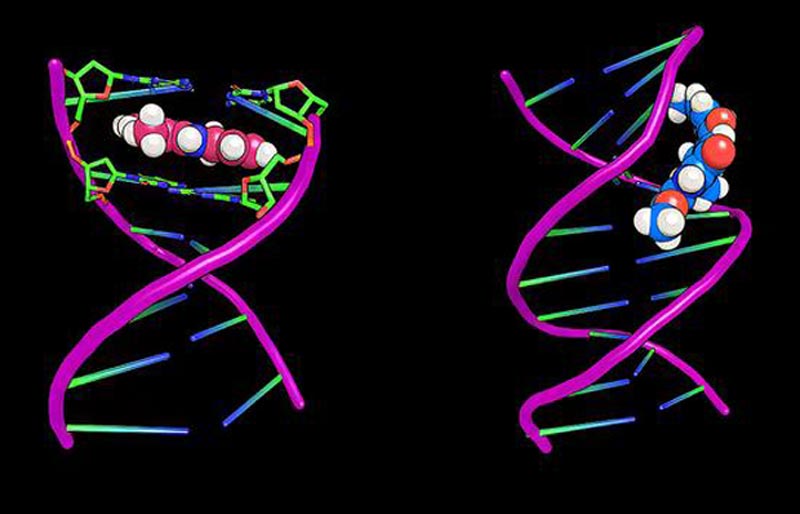

Southwest Research Institute’s Rhodium™ software can now screen potential DNA-targeting therapeutics for cancer and other diseases. This image was made using the PyMOL Molecular Graphics System (Version 3.0 Schrödinger LLC).
Credit: Southwest Research Institute
Advanced application efficiently assesses new treatment possibilities, particularly for cancer.
Southwest Research Institute (SwRI) has developed a unique technology to screen new DNA-targeting therapeutics designed to treat cancer and other diseases. Combining SwRI’s 3D drug screening software tool and machine learning techniques, SwRI scientists successfully predicted the DNA binding affinity and cancer cell toxicity for a variety of relevant drug compounds under development.
SwRI Scientist Dillon Cao (left) and Research Scientist Dr. Tristan Adamson used machine learning with guided computational modeling to enhance drug design capabilities for the development of DNA-targeted therapeutics. Credit: Southwest Research Institute
SwRI expanded the capabilities of its Rhodium™ drug development tool to visualize and rapidly predict how DNA-targeting therapeutics can attack cancer cells as well other diseases. According to the World Health Organization, cancer is a leading cause of death worldwide, responsible for one in six deaths globally. Chemotherapy uses a combination of drugs to slow or stop the growth and spread of cancer cells and shrink tumors. Many of these chemotherapeutics directly target DNA, which can damage the DNA in healthy cells and cause severe side effects, medical complications and even secondary cancers. While a number of drug development platforms and machine learning methods virtually screen drugs that target proteins, few methods exist for screening drugs that target DNA. SwRI has now successfully demonstrated a virtual screening application to design more effective DNA-targeting therapeutics to combat different types of cancer and infectious diseases.
“Cancer cells often have damaged DNA repair machinery and replicate much faster than healthy cells, which makes DNA a viable target for selective cancer treatment,” said Dr. Tristan Adamson, a research scientist in SwRI’s Pharmaceutical and Bioengineering Department. “SwRI has successfully developed and validated a powerful technique to use Rhodium™ for drug development campaigns that directly target DNA in oncology research for leukemia, breast cancer, liver cancer and more.”
Dillon Cao, an SwRI scientist working with Adamson, added, “We want to make drug compounds more selective to target a patient’s DNA for maximum efficacy while at the same time enabling scientists to prune away some of the drug toxicities.”
In an internally funded research project, SwRI scientists developed several machine learning training sets, each serving important roles in screening potential DNA-targeting oncology drugs. These models have been validated using statistical tests and correlated with published experimental data. SwRI scientists accurately predicted the effectiveness of drug compounds against several cancer cell models using the training sets and SwRI’s Rhodium™ virtual screening tool. They now plan to apply this software in future drug development programs to design next-generation cancer therapeutics.
SwRI used internal funding to develop Rhodium™ software to provide a computer-aided tool to rapidly screen possible treatment methods to combat infectious diseases and chemical warfare agents. SwRI’s machine learning capabilities can evaluate more than 2 million drug compounds in just a few days to identify compounds with high probability for successful treatment with minimal adverse side effects. SwRI has used Rhodium™ to successfully identify highly potent therapeutics for several infectious diseases, such as SARS-CoV-2 (commonly referred to as COVID-19) and hemorrhagic fevers, as well as chemical nerve agent antidotes.
SwRI has more than 75 years of pharmaceutical research and development experience including virtual drug design, medicinal chemistry, formulation, microencapsulation, process development and synthesis scale-up. SwRI’s Chemistry and Chemical Engineering Division is ISO 9001:2015 certified, meeting international quality standards for product development from initial design through Current Good Manufacturing Practice (CGMP) scale up and clinical supplies. SwRI scientists support drug development from discovery to clinical trials in FDA-inspected CGMP facilities.
For more information, visit https://www.swri.org/industries/pharmaceutical-development.
Media Contact
Tracey Whelan
Southwest Research Institute
twhelan@swri.org
Office: 210.522.2256












